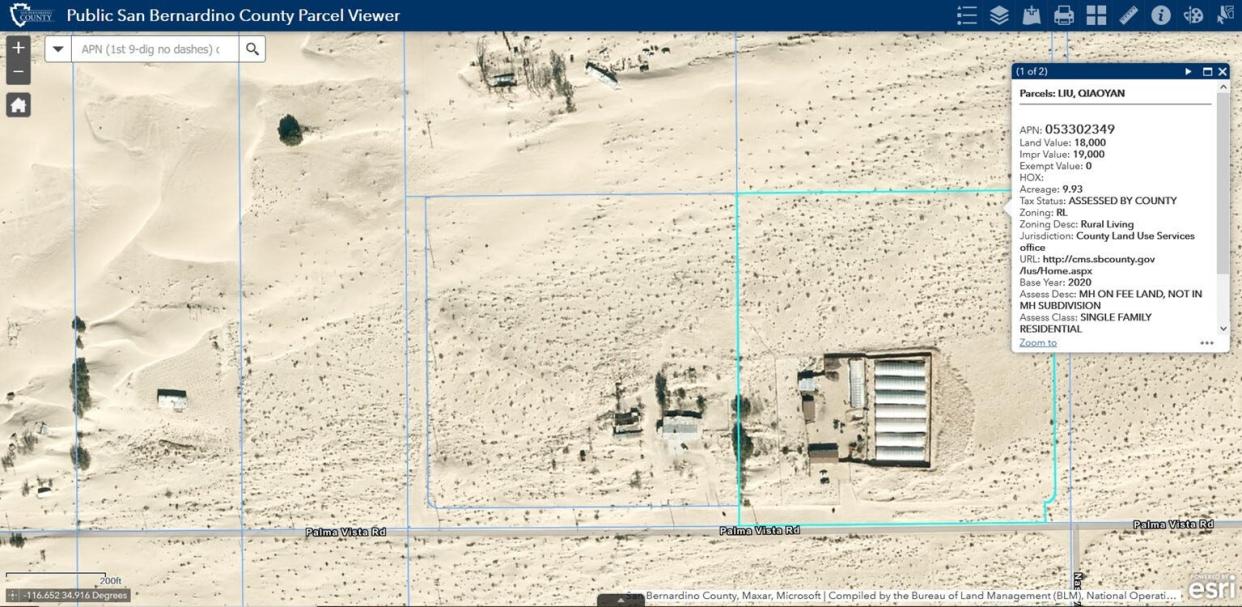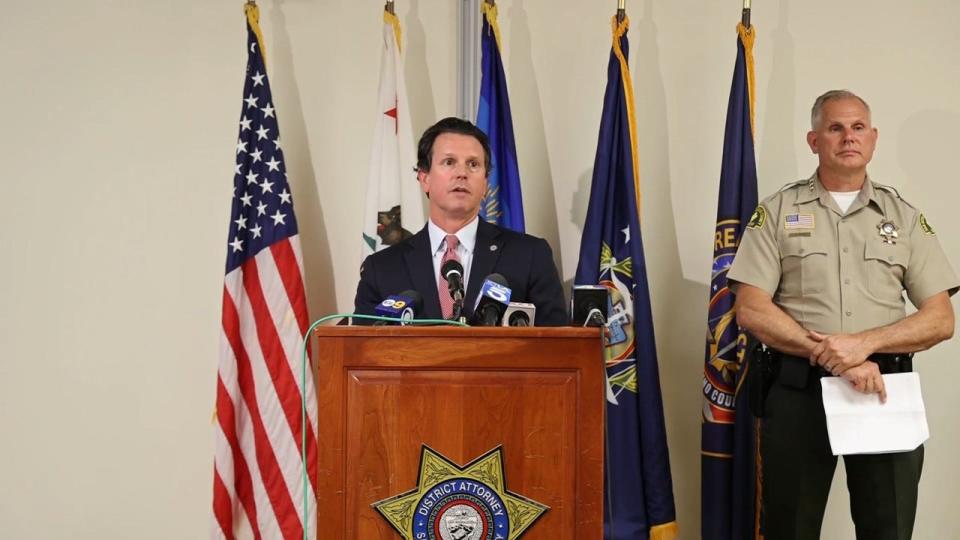DA files charges after massive subterranean pot farm found in Newberry Springs

The chief prosecutor of San Bernardino County has unveiled felony conspiracy charges centering on the alleged operation of a years-long 14,000 square-foot marijuana facility beneath the ground in a small High Desert town.
The Office of District Attorney Jason Anderson held a press conference Monday to discuss the county’s plan to prosecute 11 named defendants for felony cultivation of marijuana, violating environmental law, and misdemeanor possession of marijuana for sale.
Those facing charges are:
Cheng Lin, 30, who also faces a felony charge of conspiracy to commit a crime as one of two alleged landowner in the operation
Qiaoyan Liu, 35, the other alleged landowner facing an additional felony conspiracy charge
Zhonggui He, 59
Weijian Liu, 33
Aiqing Lin, 52
Wenren He, 42
Wu Lin, 33
Lijie Lin, 37
Bin Li, 38
Huang Lin, 27
Mingfeng He, 37
The charges are connected “to an industrial-sized subterranean illegal marijuana grow in Newberry Springs, a processing warehouse, and other properties used in conjunction with the selling, manufacturing, and distribution of cannabis.”
Joining the DA at the press conference on Monday were Code Enforcement Chief Igancio Nunez, Sheriff Shannon Dicus, and members of Dicus’ specialized Marijuana Enforcement Team.
The case started with a search warrant served by Sheriff’s deputies on Aug. 20, 2020, at the home of the alleged underground facility, a property on the 46200 block of Palma Vista Road in Newberry Springs, according to Sheriff’s Department arrest disclosures.
The property owner at the time was Cheng Lin, the DA’s Office said in a release Monday. During the August 2020 raid, deputies found eight greenhouses with 2,000 cannabis plants and over 100 pounds of processed marijuana.

Two of the newly-named defendants, Zhonggui He and Wenren He, were detained at the property in this 2020 raid, according to the DA, who alleges that the landowner, Cheng Lin, sold the property a few months later to the other defendant now facing a felony conspiracy charge, Qiaoyan Liu.
The new charges culminate in a second search on March 3. Deputies from the Sheriff’s Marijuana Enforcement Team on this more recent day found a red Conex box — a cargo shipping container — alongside the single-story house and several sheds on the property.
'Farm to table': High Desert CBD startup wants to help, not ‘bake your brains off.’
When eight new suspects separate from the previous arrestees attempted to flee, the deputies detained them and investigated further, according to the DA.
“Upon searching the Conex box, deputies discovered the floor opened and were able to descend into an underground bunker,” the DA’s statement read. “The bunker was 230 feet in length by 60 feet in width. It was constructed with over 30 Conex boxes approximately 15 feet below the ground.”
The industrial-scale farm encompassed about 14,000 square feet beneath the ground and illegally housed more than 6,000 marijuana plants, the DA alleges. Investigators estimate at least 6,000 gallons of water would be needed per day to sustain the growing operation for a black-market value of up to $9 million.
Additionally, “processed marijuana was found in the residence of Cheng Lin, as well as a commercial lease agreement in Cheng Lin’s name, for a commercial building in which law enforcement found numerous items used for the cultivation of marijuana and over (200) pounds of marijuana product,” according to the DA.
On Monday, Anderson said this case is a sign of the core law-enforcement goal in the county’s ongoing cannabis crackdown: make illegal farming hurt for the property owners.
“Once we can say that these properties are known to contain a nuisance, we’re gonna take the property,” the DA said Monday.
“If those folks can’t remediate the properties through appropriate sentence(s) that we may get in this particular case, then we will work with the county to try to take that property and then sell that property,” he continued. “The taxpayers shouldn’t be on the hook for the illegal conduct that’s been engaged in here.”
The DA linked the case to an economic goal of maintaining free and fair markets.
“You’re putting unfair competition on an industry that’s trying to be regulated,” Anderson said of the burgeoning legal-weed industry. He drew a comparison to legitimately-run Amazon Inc. warehouses and distribution centers.
“We have a bootleg Amazon selling illegal or counterfeit products out of a warehouse that’s buried underground,” he said. “Who can compete against that? Jeff Bezos couldn’t compete against that.”
Deputies found 5,500 gallons of fuel in reserves at the underground Newberry Springs property “to fuel generators that were used to air out the space and cure the plants,” according to Anderson. “There’s a lot of people that can’t afford to put gas in their car to get to work every day.”
The DA also cited heavier truck traffic and random gunfire, which multiple sheriff’s deputies and High Desert residents have reported encountering on random drives, as two examples of daily problems illegal grows are causing for residents of unincorporated regions.
Dicus, the sheriff, said Monday that gunfire hasn’t been reported from the underground Newberry Springs location, but that “the bunker case, as we call it,” still points to deeper problems in the county.
Deputies have faced gunfire from other sites of a similar scale, he says — not because the growers noticed a police presence, but “simply because they knew somebody was getting too close to their investment.”
The sheriff didn’t specify if the “the bunker case” is believed to be one part of a broader operation or the only farm operated by the suspects named Monday. He said county officials will “break down the hierarchy” that they believe is at work as time goes on.
Successful prosecution of these charges would mark perhaps the biggest case yet in the nine months of mass raids and illicit-goods seizures by the sheriff’s Operation Hammer Strike.
Dicus led the launch of the operation soon after being appointed sheriff amid calls for a crackdown on illegal cannabis grows by residents of sparsely-populated, unincorporated High Desert communities such as Hinkley and Lucerne Valley.
Newberry Springs, home to fewer than 3,000 residents roughly 20 miles east of Barstow, is another unincorporated community where illegal farms have reportedly been sprouting up exponentially in recent years, residents say.
Hammer Strike is on track to seize a total of $750 million-worth of “illegal product” when it eventually ends, Dicus said Monday, adding that he personally believes the number will end up closer to $1 billion.
The sheriff’s Hammer Strike teams, as of April 24, had arrested more than 880 people through eight months of raids at hundreds of suspected illegal cannabis grows, according to a Daily Press analysis of Sheriff’s Department disclosures.
At least 111 of these people were arrested in Newberry Springs, at one of the dozens of locations the sheriff’s special teams have raided since the operation launched.
However, most Hammer Strike arrests aren’t leading to jail bookings. Instead, they've produced citations and same-day releases as required by California’s Proposition 64, which in 2016 made all illegal cannabis farming a misdemeanor no matter the scale, contrary to most legalized states that have maintained a felony status for grows that exceed around half-a-dozen plants.
Some residents and public officials say this lenience is why illegal pot farms have been surging in the growth-rich High Desert.
The DA is seeking to escalate its charges for the growth of more than six plants to a felony based on a provision in California law that allows such an upgrade if the growth harms the environment and public lands.
The specific allegation against the Newberry Springs growers is “illegal discharge of waste and intentionally and with gross negligence causing substantial harm to public lands and other public resources.”
In an interview earlier this month, Sheriff Shannon Dicus said Mexican and Chinese cartels have specifically fueled the trend.
The department has identified 29 Hammer Strike arrestees as residents of Newberry Springs. Many more hail from places far beyond the county: at least 85 arrestees residing in Mexico, 11 living in China, and dozens from far-off states, including New York, Texas, and Massachusetts.
Charlie McGee covers California’s High Desert for the Daily Press, focusing on the city of Barstow and its surrounding communities. He is also a Report for America corps member with The GroundTruth Project, an independent, nonpartisan, nonprofit news organization dedicated to supporting the next generation of journalists in the U.S. and around the world. McGee may be reached at 760-955-5341 or cmcgee@gannett.com. Follow him on Twitter @bycharliemcgee.
This article originally appeared on Victorville Daily Press: DA files charges tied to subterranean High Desert pot farm

